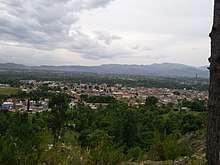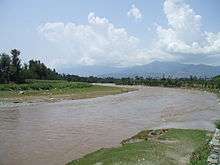Baffa
Baffa(Urdu:بفہ) is a town and Union Council of Mansehra District in the Khyber-Pukhtoonkhwa, Pakistan.[1] It lies about 15 km north of the district capital, Mansehra.[2] However, in July 2016, Chief Minister Pervez Khattak announced Baffa as Tehsil in a large gathering at Baffa Higher Secondary School. It's now Tehsil Headquarter of Tehsil Baffa Pakkhal.


History
Baffa may date back to or prior to Sikh rule.[3] It was given the status of a municipality in 1873 during British rule as a principal market town in Northern Hazara and of the neighbouring independent tracts. In 1901, the population was 7,029.
A vernacular middle school was maintained by the municipality and the District board. Baffa remained the educational hub for the Pakkhal valley, Konsh valley and Siran Valley because of the accommodation facility (hostel) attached to the Government Higher Secondary School there. At that time, this was the only high school for these three big valleys. The Municipal Committee of Mansehra took credits from the Municipal Committee of Baffa to fulfill its expenditures because the Municipal Committee of Baffa's income and revenue was more than Mansehra's.[4]
Baffa is the resting place of Mulana Ghous Hazarvi and, historically, the rallying point for Turks in the region.
Location
Baffa is situated in the Pakkhal valley of Mansehra District. The town is located on the east bank of the Siran river, in the north corner of the Pakkhli plain. Travelling via the Karakorum Highway, Baffa is 13 kilometres north-west of the district capital, Mansehra.
It is the headquarters of the historical Pakkhal Valley, also known as Pakkhal Plain. This valley is the last and largest plain between Pakistan and China. Deosai National Park is the biggest plain on the Pakistan-China Himalayan frontier, covering an area of 3000 km². Beyond the Pakkhal Valley are the world's highest mountains, the Himalayas.
The main cantonment for Turks in the region was established at the nearby village of Guli Bagh.
Attractions
Major tourist attractions include the Nanga Baba shrine, located at the top of a hillock overlooking the Pakhal Maidan (plain), Khar Maidan, Guli Bagh and Mount Tingalai.[5]
Religion
Nearly the whole population is of the Sunni Muslim sect, save for a few Shia's. Many notable Ulamas live in the town who are recognised nationwide.[5]
Demography
Tribes primarily include the Swatis, Awans, Gujjars, Tanoli and a few Turks. The total population is about 30,000. The female literacy rate for the elderly population above 80%.
Education
The overall literacy rate in Baffa is comparable to the region and several education institutions serve Baffa and the surrounding areas. The town has one government Higher Secondary School for boys and one for girls. Recently, a Graduate level college for girls was established. Private schools serve boys and girls. Recently, a new university, Hazara University, was established a few kilometres away. Educated Baffa women mostly teach. Before partition, Baffa was an educational hub for the northern Hazara division, The Government Primary School Baffa was established in 1873, Government Middle School Baffa was established in 1906 and the Government Higher Secondary School of Baffa was established in 1934, before the partition. At that time, in the northern part of Hazara division Baffa was the only town with an intermediate level institution.
Agriculture
Baffa is an agricultural hub and is the leading town of the district in producing different crops and vegetables. Baffa grows vegetables, wheat, maize, rice, sugarcane and tobacco. The area's "Super Virginia" Tobacco is considered to be the world's second best. "Lacson Tobacco Company Limited" and "Pakistan Tobacco Company" operate in the area. Tobacco farming is tedious and risky and some families find it immoral to cultivate tobacco, so they substitute vegetables. Tomatoes, potatoes, tea and other vegetables are cultivated in large numbers. The climate of Baffa is suitable for tea farming. Research about tea production in Pakistan was initiated by a local farmer. Privately owned tea farming in Baffa began in the late 1970s. The owner of Brook Bond, one of the world's leading tea companies, visited Baffa in the early 1980s and admired the farmer's research. The Government of Pakistan established Pakistan's first tea research centre, the National Tea Research Institute (NTRI), in Baffa. Pakistan's first tea was planted at Baffa. The Agricultural Extension Department and Agricultural Research System Department are both established there.
Development
A bridge constructed by the British government in 1935 links the small town Inayat Abad to Baffa. In 2002, floods damaged it badly; however, it was reconstructed.
Little development occurred from 1995 to 2015. Despite its success as a top quality cultivator of tobacco, Baffa does not have high quality tobacco roasting facilities. Baffa was affected by the October 2005 earthquake, although less than surrounding areas.
Electricity projects were started in the mid 1950s. The telecommunication sector of Pakistan, PTCL, started service in the mid 1970s. One public hospital is there.
Local commerce is carried out in the city centre, specially commercial center Adnan Plaza nearby.
Sports
Sports activities in Baffa include football, volleyball, swimming and cricket. Every year, tournaments are held at the Boys High school Ground Baffa. The most popular games are cricket and football. During a year a so football become a popular sports in the town and now there are almost half a dozen active football clubs in the town competing in tournaments in and out of the town.
References
- "Tehsils & Unions in the District of Mansehra – Government of Pakistan". Nrb.gov.pk. Archived from the original on 18 July 2011. Retrieved 5 May 2013.
- EARTHQUAKE AFFECTED AREA OVERVIEW – United Nations Joint Logistics Centre
- Hazara gazetteer 1883–84
- "Imperial Gazetteer of India". Dsal.uchicago.edu. Retrieved 5 May 2013.
- "Baffa Town (Land of Hospitality, Heart of Pakkhal Valley)". Baffa Town (Land of Hospitality, Heart of Pakkhal Valley).